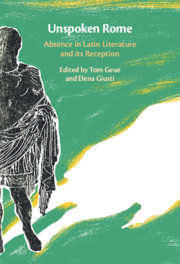Book contents
- Unspoken Rome
- Unspoken Rome
- Copyright page
- Contents
- Figures
- Unspoken Rome: Acknowledgements
- Contributors
- Introduction
- Part I Absence in Text
- Chapter 1 Catullus’ Sapphic Lacuna
- Chapter 2 Speaking Aposiopeseis
- Chapter 3 Allegorical Absences
- Chapter 4 Tamen apsentes prosunt pro praesentibus
- Chapter 5 Absence Left Wanting
- Chapter 6 The Gaze on the Void
- Part II Absence in Context
- Part III Going Beyond
- Afterword Lights Out
- Bibliography
- General Index
- Index Locorum
Chapter 2 - Speaking Aposiopeseis
The (Generic) Sound of Silence in Statius’ Thebaid*
from Part I - Absence in Text
Published online by Cambridge University Press: 03 September 2021
- Unspoken Rome
- Unspoken Rome
- Copyright page
- Contents
- Figures
- Unspoken Rome: Acknowledgements
- Contributors
- Introduction
- Part I Absence in Text
- Chapter 1 Catullus’ Sapphic Lacuna
- Chapter 2 Speaking Aposiopeseis
- Chapter 3 Allegorical Absences
- Chapter 4 Tamen apsentes prosunt pro praesentibus
- Chapter 5 Absence Left Wanting
- Chapter 6 The Gaze on the Void
- Part II Absence in Context
- Part III Going Beyond
- Afterword Lights Out
- Bibliography
- General Index
- Index Locorum
Summary
Despite the many studies devoted to aposiopesis in Latin poetry, a deeper insight into this rhetorical figure in Statius’ Thebaid is called for. This paper argues that Statius is the first to use such a figure of speech extensively in Latin epic and does so in his poem also marking programmatic loci, teasing out a tension between the epic and other literary genres, otherwise said between the Thebaid itself and the ones before it (see e.g. Theb. 4, 516; 8, 60; 7, 210; 12, 301; 380–5). By discussing some of the most relevant points, my paper highlights Statius’ programmatic use of aposiopesis: it shows the poet’s choice to avoid deviations to other poetic genres – such as tragedy or elegy – in his epic, in contexts where such contaminations would not be suitable. Moreover, the paper argues that aposiopesis is a relevant intertextual link between the Thebaid and Statius’ poetic background: we are dealing with silent challenges which further develop Statius’ meta-poetic discourse on generic interactions and literary memory.
- Type
- Chapter
- Information
- Unspoken RomeAbsence in Latin Literature and its Reception, pp. 35 - 46Publisher: Cambridge University PressPrint publication year: 2021
- 1
- Cited by

